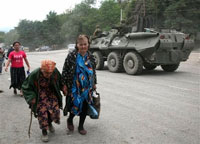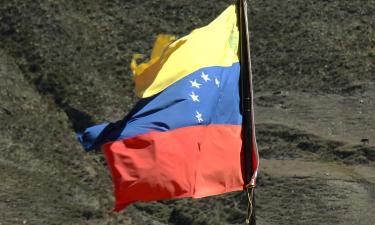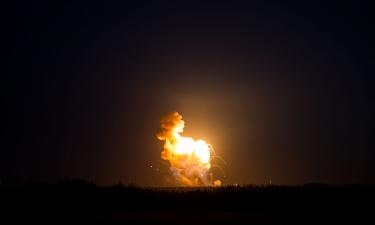Georgian troops burn South Ossetian refugees alive
Israeli mass media published several articles August 10 dedicated to the war in South Ossetia. Newspapers paid special attention to arms shipments to Georgia, which Israel had made in the past. A former defense ministry official said that the Georgian army had no chances in the opposition to the Russian army.

Russia’s Foreign Ministry accused Ukraine of encouraging Georgia to interventions and ethnic cleansings in South Ossetia. Russia also claimed that Ukraine had armed Georgia to the teeth. Georgia’s ground forces possess weapons, ammunition, unmanned aircraft, night vision goggles and other equipment made in Israel.
Israel’s Defense Ministry recommended to cease arms shipments to Georgia after the start of military actions in South Ossetia, not to provoke Russia.
Battles in South Ossetia continued throughout the night. Russian sources said that about 2,000 people had been killed in South Ossetia.
Ukrainian Foreign Ministry stated that the country reserved the right to forbid vessels of the Russian Black Sea Navy to return to their base in Ukraine’s Sevastopol.
Ukrainian official said that Ukraine was not willing to become involved in the conflict.
In the meantime, the armed forces of another unrecognized republic, Abkhazia, moved closer to its borderline with Georgia, Interfax reports with reference to Abkhazia’s defense ministry.
“Georgia does not stop its treacherous actions on Abkhazia’s border and continues to intensify its military presence. The armed forces of the republic were forced to enter the security zone and advance towards the Georgian border,” an official spokesman for the defense ministry of Abkhazia said.
It was reported that Georgia delivered a note to the Consul of the Russian Federation to Georgia which said that Georgia intended to end military actions in South Ossetia on August 10.
The note also said that Georgia was ready to immediately start cease-fire negotiations with the Russian Federation, Interfax reports.
However, fierce battles in South Ossetia continued on August 10 despite the official note. In addition, Georgia’s Defense Minister, Timur Yakobashvili, stated Sunday that the retreat of the Georgian troops from South Ossetia was out of the question.
“We decided to redeploy our troops to be able to resist the Russian armed forces, which outnumber our troops,” Yakobasvili said.
Russia’s General Staff of Armed Forces said that Russia had lost only two fighter jets in the conflict zone, but not 12 jets, as Georgian officials previously claimed.
“This number has nothing to do with the real state of affairs. We lost two aircraft – Su-25 and Tu-22 – and the situation has not changed since then,” Russia’s senior defense official, Anatoly Nogovitsin said.
Ossetianjournalists wrote on their website that Georgian troops had captured a group of refugees from one of the regions of S. Ossetia. The Georgian military men locked them in a house and set the house on fire, burning all the people inside alive. An Ossetian woman informed Russian Prime Minister Putin of the hideous crime during his visit to a refugee camp. Another woman told Putin that she had seen a Georgian tank running over an elderly Ossetian woman who was trying to save two children. The woman was running out of the village, occupied the by the Georgian troops.
French Foreign Minister Bernard Kouchner called the hostilities in South Ossetia "massacres" and also said Sunday he would press Georgia and Russia for an immediate end to the violence in the breakaway Georgian province.
Kouchner said the EU cannot allow such a "Middle Age battle" to continue. He spoke in an interview with The Associated Press hours before he and Finnish Foreign Minister Alexander Stubb left Paris for a meeting with Georgian President Mikhail Saakashvili in Tbilisi.
The EU "cannot accept such a war, a terribly devastating and ... unacceptable war, at our doors," Kouchner said. France has held the EU's six-month rotating presidency since July 1.
French President Sarkozy, who spoke by telephone with Russian President Dmitry Medvedev and Georgian Mikhail Saakashvili, said an agreement between the two neighbors not to use force against one another would be the best way of making sure any future accord would stick.
Russian Foreign Minister Sergey Lavrov, however, disputed Georgia's claim that its troops have pulled out of South Ossetia. He said there were still Georgian troops in certain neighborhoods of provincial capital Tskhinvali, the AP reports.
Russia, which has outgunned the Georgian army and showcased its military might during the conflict, must be treated as "a great partner" in order for a political solution to be found, Kouchner said.
"There is not at all a military solution in this area, absolutely not, and we all know that," he said.
The EU, the United Nations and the U.S. could be among participants in any future political solution, Kouchner said. He did not say in what role they could contribute.
Polish Foreign Minister Radek Sikorski urged the EU to send a peacekeeping mission, telling Poland's TVN24 that Europe "could be a good partner because it's credible to both sides. "
Georgia began an offensive to regain control over South Ossetia overnight Friday, launching heavy rocket and artillery fire and air strikes, killing hundreds of innocent people. In response, Russia, which has granted passports to most South Ossetians, launched overwhelming artillery shelling and air attacks on Georgian troops.
Subscribe to Pravda.Ru Telegram channel, Facebook, RSS!




